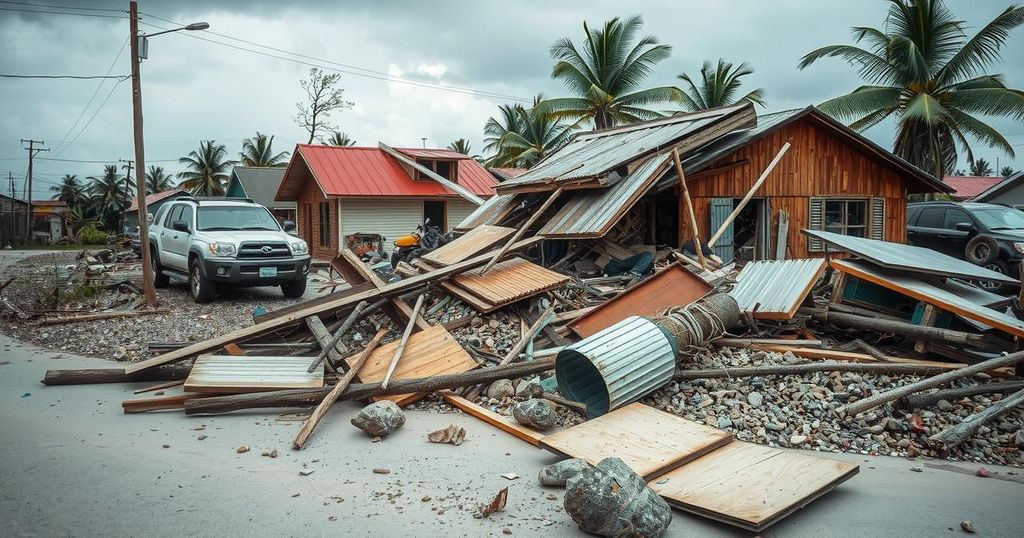World news
AFRICA, CHAPO, CHI, DANIEL CHAPO, DISASTER MANAGEMENT, EMERGENCY RESPONSE, EUROPE, FLOODING, FRANCE, FRENCH INDIAN OCEAN, ING, INGD, INTERIOR MINISTRY, MALAWI, MAYOTTE, MEMBA, NATIONAL INSTITUTE OF RISK AND DISASTER MANAGEMENT, NATURAL DISASTER, NATURAL DISASTERS
Daniel O'Connor
0 Comments
Cyclone Chido Devastates Mozambique and Mayotte, Resulting in Numerous Fatalities
Cyclone Chido has resulted in the deaths of 94 people in Mozambique, with over 622,000 affected. The cyclone hit on December 15, causing significant damage to education and health services. Local authorities are mobilizing support amid ongoing recovery efforts in Mayotte, where the storm was particularly devastating.
Cyclone Chido has tragically resulted in the deaths of 94 individuals in Mozambique following its landfall on December 15. The National Institute of Risk and Disaster Management (INGD) reported that approximately 768 people sustained injuries, while over 622,000 individuals were affected by this natural disaster in some manner. The cyclone, which brought winds reaching 260 km/h (160 mph) and 250 mm of rain within its initial 24 hours, initially caused devastation in Mayotte before progressing to Mozambique, Malawi, and Zimbabwe.
The storm predominantly impacted northern Mozambique, with Cabo Delgado being the first region hit, followed by Niassa and Nampula. The educational and health sectors experienced significant disruptions, with more than 109,793 students affected and extensive damage to school infrastructure. In addition, 52 health facilities were compromised, exacerbating the challenge of access to essential health services, particularly in areas already experiencing limited healthcare resources.
In response to the calamity, Daniel Chapo, the leader of Mozambique’s ruling party, articulated the government’s commitment to mobilizing comprehensive support. During a site visit to Cabo Delgado, he conveyed that alongside the INGD, efforts are being focused on rebuilding affected provinces including Mecúfi, Nampula, Memba, and Niassa. In Mayotte, the storm represented the most severe weather event of the past 90 years, leading local officials to anticipate a potentially higher death toll as assessments continue.
Despite ongoing humanitarian efforts, many inhabitants in Mayotte remain without basic necessities. An air bridge is facilitating the daily delivery of around 100 tonnes of supplies, with the interior ministry confirming the distribution of substantial food and water resources. The situation remains dire as residents are advised to purify water before consumption.
This recent cyclone underscores the growing vulnerability of social infrastructure amid climate change, emphasizing the need for resilient planning and mitigation strategies. Although ascertaining the specific effects of climate change on individual cyclones can be complex, it is recognized that human activities have contributed to increased precipitation and intensity in tropical storms as highlighted by the UN’s climate body, the IPCC.
Cyclone Chido has had a devastating impact on Mozambique, a nation frequently afflicted by severe weather events due to its geographical position in southeastern Africa. The storm’s approach was marked by exceptionally high wind speeds and rainfall, causing widespread fatalities, injuries, and infrastructural damage. It serves as a poignant reminder of the historical volatility of the region’s climate, exacerbated by climate change, which has raised concerns regarding the resilience of communities and essential services in the face of increasing natural disasters.
In summary, Cyclone Chido has inflicted substantial harm on Mozambique, claiming 94 lives and affecting hundreds of thousands of residents. The cyclone’s destructive path across multiple nations, contrasted with ongoing recovery efforts in Mayotte, highlights the urgent need for resilient infrastructure and comprehensive disaster preparedness. This event signals an imperious call to action for governments and communities to prioritize climate adaptation strategies to mitigate future crises.
Original Source: www.bbc.com




Post Comment